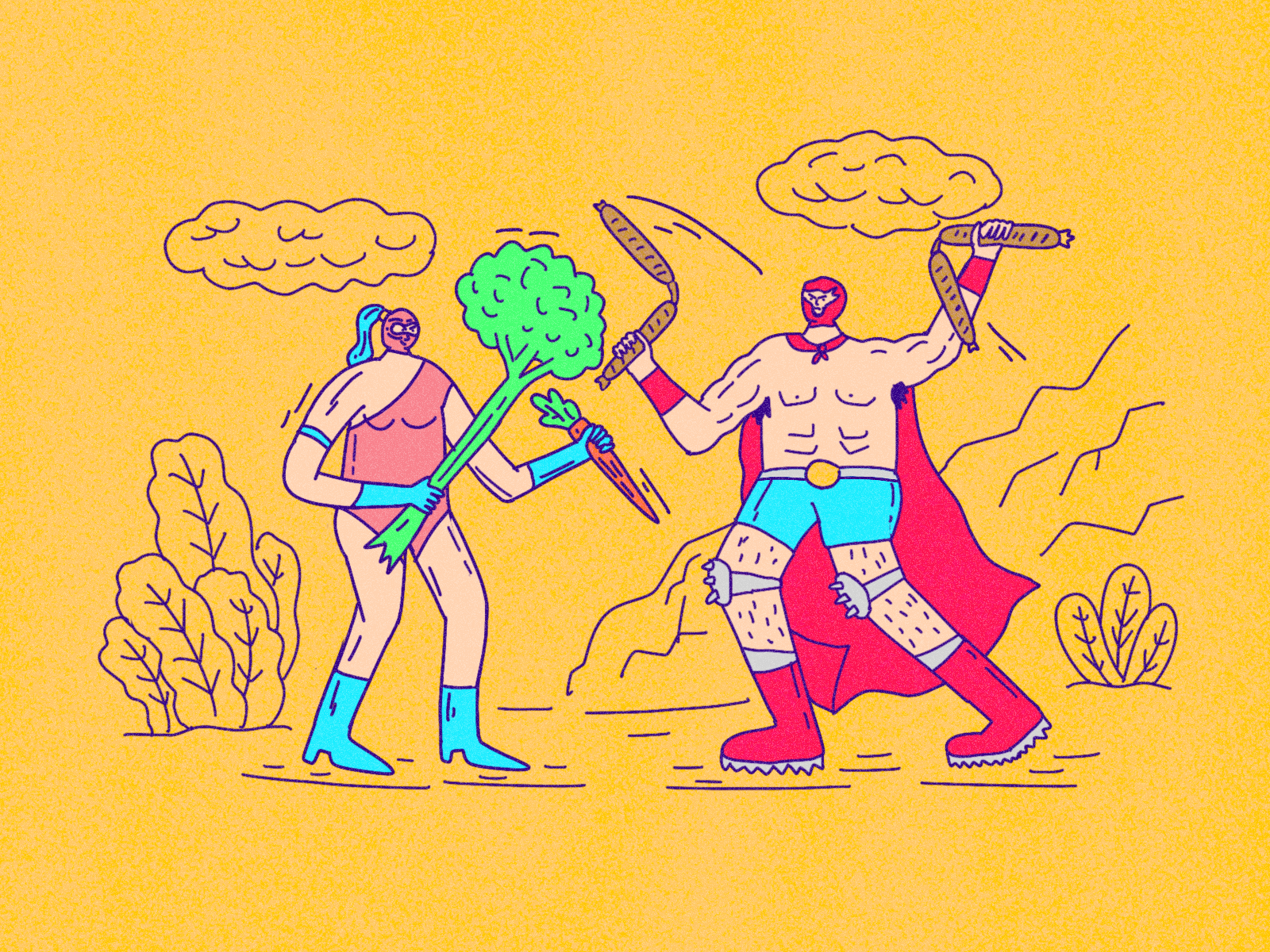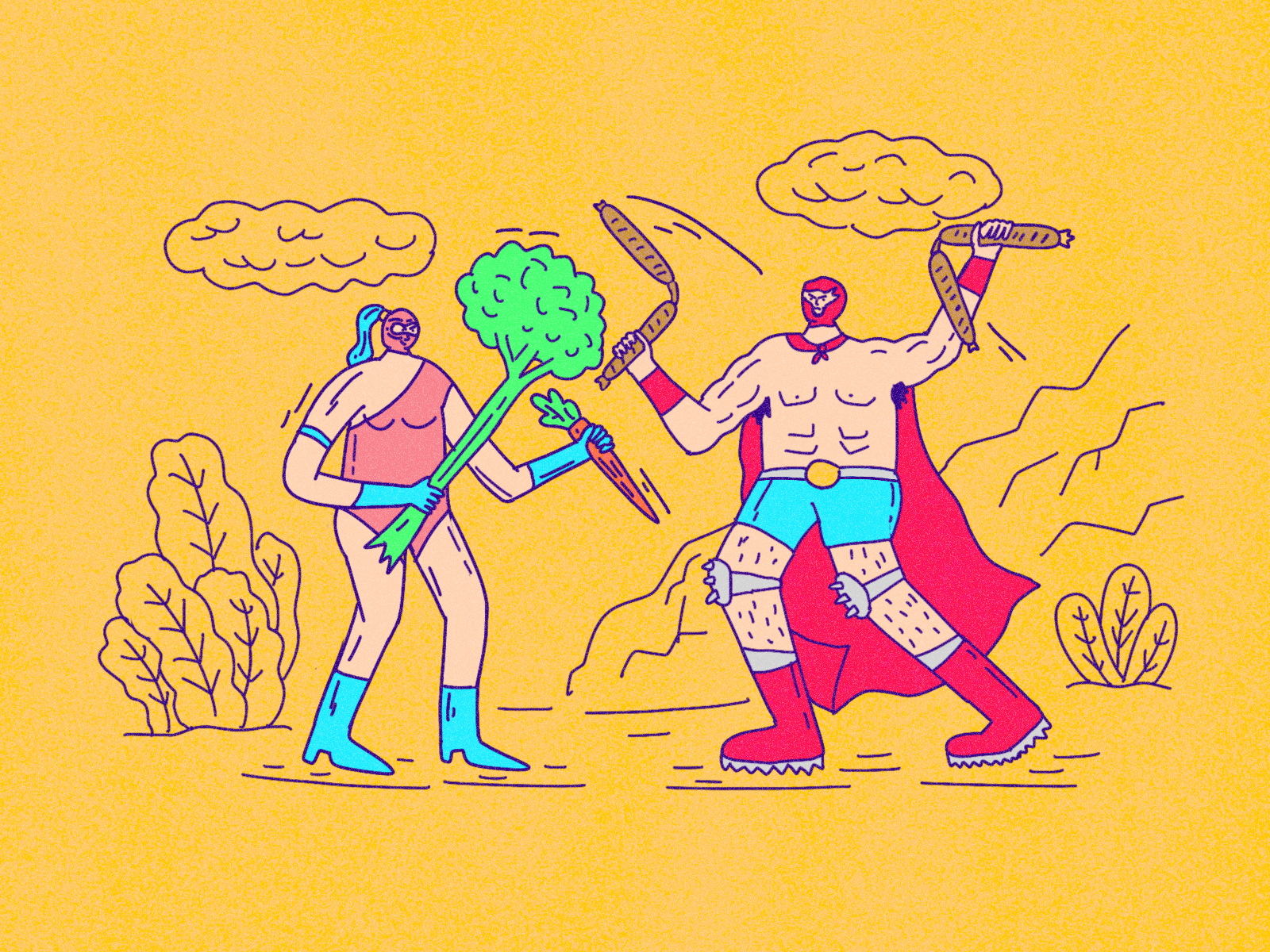What is veganism associated with? Sustainability? Or a healthy diet? Whatever our answer is, the community of vegan people is diverse; no stereotype can be applied to all members. Debates where we hear two antithetical opinions can be refreshing as we can look outside our comfortable opinion bubble for a few hours. Such a debate took place recently between Barbara Gyimóthy, vice-president of the Hungarian Vegan Association, and Tamás Éder, president of the Hungarian Meat Industry Federation.
Before the official start of the debate, Éder highlighted that it is not self-evident that defenders of the meat industry participate in open discussions: it is a thankless task to defend an old-fashioned activity, and his position is not helped by his personal circumstances that he is an older man coming from the corporate world. But then why did he decide to attend this debate? Firstly, as president of the Meat Industry Federation, it is expected of him. Secondly, he is pleased that two people with antithetical opinions can sit down and discuss a controversial issue in a civilized way, which is unfortunately painfully rare nowadays.
Firstly, to understand the debate, we need to clarify what it means to be a vegan. Gyimóthy believes that, above all, a vegan lifestyle is a moral position. It is much more than a simple diet, as it opposes the exploitation of animals in all aspects of life. It is not automatically a healthier or more sustainable lifestyle than having a diet that includes meat, but it has the potential to be. A vegan’s diet is healthy if it aims to be a whole-food plant-based diet, and a person following a plant-based diet will not have a much more sustainable lifestyle if they use cars, take flights, and buy vegetables in plastic packaging.
Éder agreed with Gyimóthy’s points but added that vegans have to take essential nutrients through supplements that meat can provide for those with an omnivorous diet. So, having a balanced, healthy vegan diet is possible but not easy. Éder highlighted that eating is not only a functional activity but also has a strong cultural and community-building power. Hungarian cuisine is virtually inseparable from meat, which can easily add another layer of problems for vegans.
Gyimóthy said that it is probably easier to be a vegan than ever before and added that following a balanced vegan diet is not difficult. It is not true that vegans must give up certain flavors or textures as there are nowadays substitutes for almost everything. Going vegan in 2022 is as difficult as going to the market. According to statistics, dietary supplements are bought mainly by non-vegans.
Veganism cannot be discussed without talking about sustainability and environmental impacts. Most people go vegan because of health or sustainability reasons. A protein supplement is not healthier than the animal protein that it substitutes. But even a plastic-wrapped vegan cheese is more environmentally friendly than a piece of meat as factory farming uses a lot of water, and the caused environmental erosion is also staggering.
Gyimóthy addressed the question of Hungarian meat as it is less harmful from an environmental perspective than those animal products that need to travel thousands of kilometers to Hungarians’ tables. But this aspect is only one side of the coin. Firstly, from the perspective of animal welfare, it is not better at all if the animals are killed in Hungary and not elsewhere. Secondly, there is no regulation on the fodder that Hungarian animals are fed for the product to be called „Hungarian meat.” A significant proportion of fodder that animals eat in Hungary comes from South America, which further increases the ecological footprint of the produced meat.

New trends in Europe tend to spread from west to east, and veganism is no exception. It is not as popular in Central and Eastern Europe as in the western part of the continent, but the post-communist region is gradually catching up. As there is no official database, the quantity and variety of plant-based products in the supermarkets can be a good indicator to estimate the number of those who follow a plant-based diet. 10-12 years ago, there were almost no animal protein substitutes on the shelves, but now the shops are full of these products. Éder sees a similar trend and claimed that 2-5% of the population should start following an alternative diet for marker players to take notice of it. However, he added that the picture is more nuanced as many people just try veganism for a shorter period and then revert to an omnivorous diet.
The suppliers of the meat substitutes are different market actors in different parts of the continent. In Western Europe, the leading companies in the meat industry are riding the new trend by adding vegan hamburger patties, vegan bacon, and vegan steak to the list of their products in addition to the original animal-based goods. On the other hand, in the Mediterranean region and Central and Eastern Europe, the approach is fundamentally different. In these more conservative countries, animal-based product supplier companies are reluctant to follow the new trend. They are even lobbying for the authorities not to allow plant-based substitutes to be near meat in shops. Market players in the meat and dairy industry do not want their traditional products to be confused with the new vegan alternatives.
Generally, our eating habits are changing much slower than most other cultural traditions. However, the past 30-40 years show a bit different picture, especially in Central and Eastern Europe after the democratic transitions of the countries. Forty years ago, there was no such bustling, maybe even overwhelming, food scene as today. Nowadays, we cannot walk five minutes in major cities without bumping into a pizzeria, Chinese takeaway, or a hot dog cart. Nonetheless, meat industry players are not worried that our eating habits will change dramatically in the future. It will be more due to external, psychological influences if they do change. For instance, if the states or a supranational organization would decide to levy tax on meat and/or other animal products, or in a more extreme case, ban selling meat.
Meat tax or similar measures to tighten the meat industry would be good for the environment. Today, in Hungary, 27% VAT is paid on vegetables, but just 5% on pork, though it takes 30 plant-based calories to produce 1 animal-based calorie, not to mention that 15,000 liters of water are used to produce 1 kilogram of beef. Éder believes that we are in the middle of a process regarding animal welfare. When he was a child, it was common practice to chain dogs or slaughter pigs without stunning, but in 2022 these are virtually unthinkable. Market players must follow the changing social expectations, so, in addition to energy efficiency, humanity and animal rights have recently come to the fore.
At the end of the debate, the animals’ right to self-determination was discussed. Éder argued that farmed animals could not survive in the wild and would die quickly. Gyimóthy acknowledged this, but she believes that we must reduce the number of livestock by curbing breeding and consumption. Today there are 75 billion farmed animals for 7.5 billion people, many of whom are subjected to brutal, inhumane living conditions.
Whatever the faith of the meat industry will be in the future, such debates on social issues will certainly help us see the world less black and white. When we hear that one is vegan, we should not automatically believe that they are a wild hippie or a sustainability champion saving the world.

The meeting of old and new | Armenian memories on a Texas church

A dream come true for LEGO-fans in Korea










